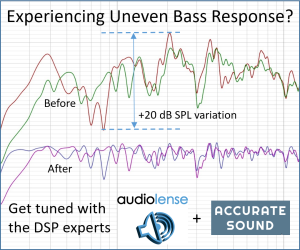AudiocRaver
Loved and Remembered Emeritus Reviewer
More
- Preamp, Processor or Receiver
- Onkyo TX-SR705 Receiver
- Main Amp
- Crown XLS 1502 DriveCore-2 (x2 as monoblock)
- Additional Amp
- Behringer A500 Reference Power Amplifier
- Front Speakers
- MartinLogan Electromotion ESL Electrostatic (x2)
- Center Channel Speaker
- Phantom Center
- Surround Speakers
- NSM Audio Model 5 2-Way (x2)
- Subwoofers
- JBL ES150P Powered Subwoofer (x2)
It is a well-documented fact that we as humans are quite insensitive to phase shift, at least with fairly simple test tones from a single speaker, and that a HUGE amount of phase shift is necessary before we CAN hear it. To be clear. Here is a quote excerpted from an article on the topic..
"All things being equal, and if one has the option, of course get the phase correct - at least at the one point in space where it can be done!! However, this presents problems for two-eared listeners in multiple seats in reflective rooms (solve this one and a Nobel prize awaits). It is indeed fortunate that humans are so unresponsive to this effect because, if we could hear phase shift, we would go absolutely nuts in everyday life."
For now, I am not going to comment on the silly "we have two ears" remark. We'll have fun with that one in another thread!
For the purpose of this thread, I ask: Is speaker EQ (auto or manual), WITH phase correction, such as Dirac Live, better than that WITHOUT phase correction? And of course if one assumes that Toole's remarks as quoted above are the end-all rule on the subject, then phase correction would make no - or very little - difference. Here's the thing, though: Many make that very assumption, and it is only conditionally correct. Toole is first to say so.
Phase response with beings that have two ears, like us (Floyd said so himself!) have the ability to locate sound sources in 3D space, and with pretty good accuracy. In a 2-channel room, we are able to locate sounds in an immersive soundstage with great accuracy as well.
So here is the question: How sensitive are we as humans to phase differences between signals in the perception of a soundstage? And how does that affect the question of AutoEQ with/without Phase Correction?
"All things being equal, and if one has the option, of course get the phase correct - at least at the one point in space where it can be done!! However, this presents problems for two-eared listeners in multiple seats in reflective rooms (solve this one and a Nobel prize awaits). It is indeed fortunate that humans are so unresponsive to this effect because, if we could hear phase shift, we would go absolutely nuts in everyday life."
For now, I am not going to comment on the silly "we have two ears" remark. We'll have fun with that one in another thread!
For the purpose of this thread, I ask: Is speaker EQ (auto or manual), WITH phase correction, such as Dirac Live, better than that WITHOUT phase correction? And of course if one assumes that Toole's remarks as quoted above are the end-all rule on the subject, then phase correction would make no - or very little - difference. Here's the thing, though: Many make that very assumption, and it is only conditionally correct. Toole is first to say so.
Phase response with beings that have two ears, like us (Floyd said so himself!) have the ability to locate sound sources in 3D space, and with pretty good accuracy. In a 2-channel room, we are able to locate sounds in an immersive soundstage with great accuracy as well.
So here is the question: How sensitive are we as humans to phase differences between signals in the perception of a soundstage? And how does that affect the question of AutoEQ with/without Phase Correction?














